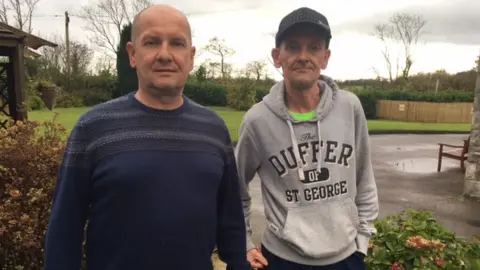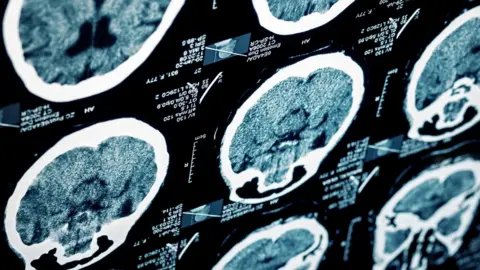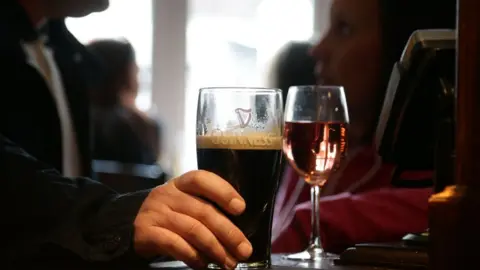Drinker diagnosed with brain damage from alcohol
 BBC
BBCThe family of a man diagnosed with alcohol-related brain damage (ARBD) say they spotted his symptoms but were unaware of the condition.
Tyrone Tucker, 48, was diagnosed with ARBD earlier this year.
But thousands of people in Wales could have the condition, an expert warned.
Dr Julia Lewis, a consultant addiction psychiatrist, said it often went undiagnosed or was wrongly diagnosed as early-onset dementia.
Mr Tucker, a former factory worker from Aberdare, Rhondda Cynon Taff, had always drunk heavily, but his drinking got out of control after he was made redundant.
"I started drinking at an early age, obviously I was drinking far, far too much - I'm surprised given how thin I am how much alcohol I could consume, but my brain was telling me I needed more," he said.
"I probably was an alcoholic but I couldn't see it," he added.
"I've always worked in the food chain. I never missed a day's work through my drinking."
 Getty Images
Getty ImagesHis brother Robert said his family had spotted symptoms of ARBD without realising what it was.
He said: "One of the things I noticed was his personal care deteriorating and his gait - the way Tyrone was walking.
"I just thought he'd had a drink again because he was unsteady and his legs were opening out a bit just to keep the balance. Afterwards when I found out more information it all fell into place."
Dr Lewis, from Aneurin Bevan University Health Board, said while the symptoms of ARBD have been known about for a long time, diagnosis was relatively new.
"We've known about some of these individual syndromes that lie under that umbrella for a very long time - since the late 1800s," she said.
"But this concept of an overarching syndrome is fairly new in our thinking and we've gone through an evolution in what we've called it.
"We did call it alcohol-related dementia for a number of years, but it's not a dementia because if you can help people to stay off alcohol it doesn't get any worse."
Dr Lewis, who is Wales' leading expert in ARBD, said it may not just be those with a dependency on alcohol who are at risk of developing the condition.
"Generally it's considered a risk for men who are drinking more than 35 units a week and women who are drinking more than 28 units a week for a period of at least five years," Dr Lewis said.
"But there are people who are recognising subtler forms of this in people who are binge drinking as opposed to dependent drinkers."
According to Public Health Wales, 241 people were diagnosed with ARBD in 2012 - an increase of 38% over five years.
But experts believe there are many more people living with the condition.
"We are definitely talking in the thousands," said Dr Lewis.
"There was some research done on post-mortem sampling of brains looking for one specific type of ARBD called Korsakoffs and the average in the general population was that 1.5% of brains at post-mortem showed evidence of Korsakoff Syndome.
"If you then shift that purely to the alcohol-dependent population that's actually 35%, with only 16% having been diagnosed in life, so potentially the problem is huge."
 PA
PABrynawel Rehab in Llanharan, Rhondda Cynon Taff, is the only centre that offers specialist rehabilitation for people with ARBD in Wales.
Chief executive David Richards said while symptoms were similar to dementia, getting a correct diagnosis was vital.
"There are huge similarities with other forms of dementia," he said.
"They have problems with their memory, in the ability to plan and make simple decisions, and in how they treat other people.
"But the critical thing is the fact that people can recover from ARBD.
"There's a huge body of evidence to show that at least 25% can fully recover and then it goes up in increments, so the next 25% there's a substantial improvement, the next 25% a slight improvement and, unfortunately for some people, in the last 25% there will be no improvement."
The Welsh Government has set up a working group to look at assessment and treatment of the condition and is due to report back in September.
